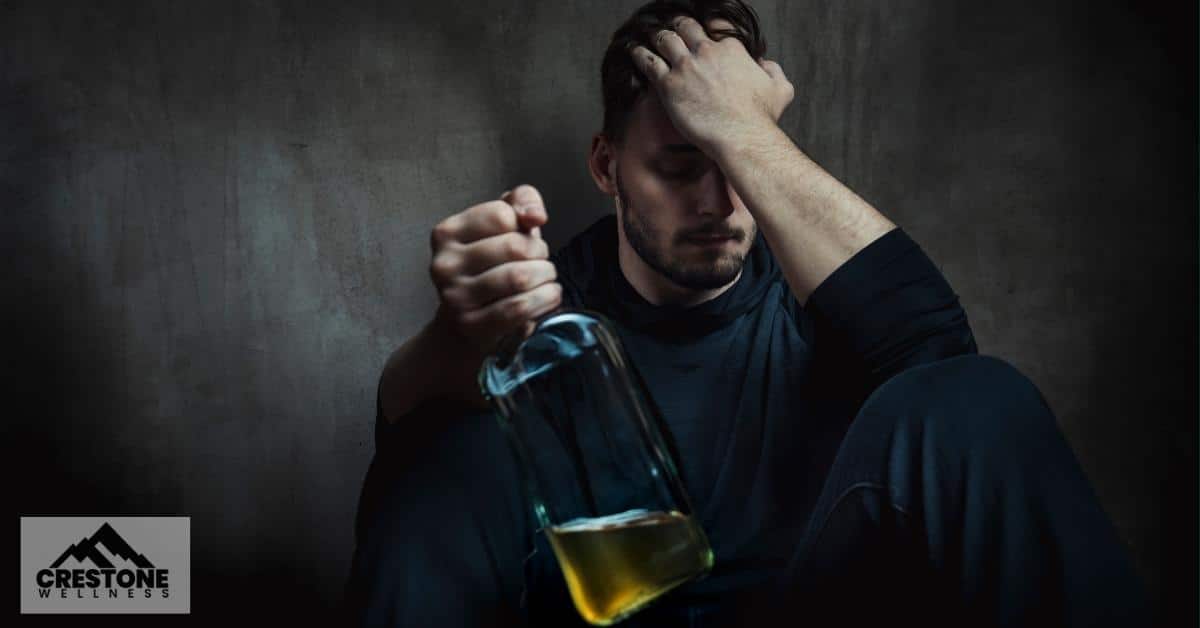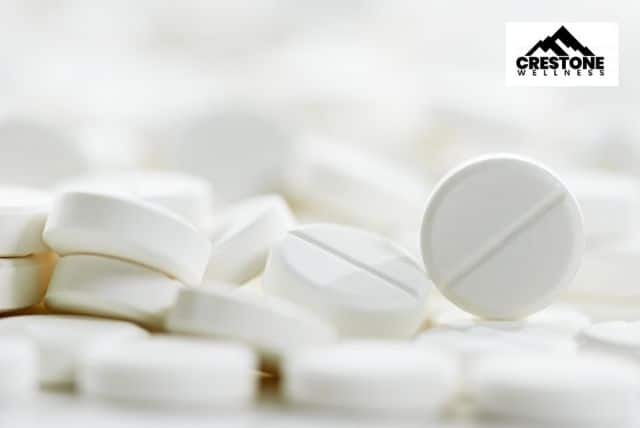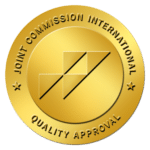The National Dietary Guidelines advise women to limit their alcohol consumption to one drink per day and males to two drinks per day.
Drinking more alcohol than this raises your chance for serious withdrawal symptoms, including liver disease and cardiovascular disease, among others. Even moderate or lower levels of alcohol consumption can increase a person’s chance of developing cancer and becoming psychologically dependent.
If you have been struggling to quit alcohol and need help managing your withdrawal symptoms, talk to us today! At Crestone Detox Austin – Alcohol & Drug Rehab, we have a number of programs to help you stop drinking safely.
Understanding Alcohol Withdrawal Syndrome (AWS)

According to the Substance Abuse and Mental Health Services Administration, roughly six percent of the population suffers from alcohol dependence.
What Happens When You Quit Alcohol?
When you stop drinking alcohol abruptly, your body is deprived of the effects and will need time to get back to normal. This can cause unfavorable symptoms such as elevated blood pressure, headaches, anxiety, and more severe withdrawal symptoms, such as delirium tremens and seizures.
Experiencing Withdrawal Symptoms Implies Dependency
Even if you experience mild withdrawal symptoms, it is a tell-tale sign that you are dependent on it or have an alcohol use disorder.
Alcohol Withdrawal Syndrome
The term “alcohol withdrawal syndrome” is a broad term used to describe the withdrawal symptoms that someone experiences when they stop consuming alcohol after previously being physically or psychologically dependent on it.
Determining the Severity of Your Symptoms
To identify risk factors and the severity of your AWS, you can use the Clinical Institute Withdrawal Assessment, which uses the number of symptoms of alcohol withdrawal you are experiencing to determine whether you are at risk for delirium tremens.
Alcohol Withdrawal Symptoms

Symptoms of alcohol withdrawal range from mild to severe. Here are some of the symptoms you may experience when you stop drinking completely:
- Tremors or shakes
- Headaches
- Anxiety
- Fatigue
- Changes in mood
- Dilated pupils
- Loss of appetite
- Insomnia
- Gastrointestinal disturbances
- Hallucinations
- Pale skin
- Heart palpitations
- Increased heart rate and/or blood pressure
- Hyperthermia
- Delirium tremens
- Seizures
- Chest pain
Understanding Severe Withdrawal Symptoms
Severe symptoms include delirium tremens and alcohol withdrawal seizures, which can be life-threatening. This is why seeking help to break cycles of addiction is imperative to ensuring your long-term success.
What Causes Alcohol Withdrawal Symptoms?

Multiple biological processes are impacted by the regular consumption of alcohol, which causes alcohol withdrawal when trying to stop. The central nervous system is first stimulated and disturbed by excessive drinking.
Alcohol Makes You Feel Good at First
After consuming alcohol, people experience a calming impact on the brain that suppresses some neurotransmitters and makes them feel relaxed. This explains why drinking alcohol causes people to feel happy, more sociable, and relaxed initially. It also explains how alcohol addiction can start.
Those Who Drink Heavily Will Experience Depressive Effects
The brain is almost constantly exposed to the depressive effects of alcohol in a heavy drinker. As a result, they start to become dependent on it. Alcohol dependence means the body needs more of the drug to have the same effect.
Withdrawal Symptoms Occur as the Body Adjusts
It no longer inhibits neurotransmitters when you abruptly stop consuming alcohol. The brain tries to balance out the new chemical imbalance, leading to crippling withdrawal symptoms that are very different from the “feel good” effects of alcohol intake.
How to Relieve Alcohol Withdrawal Symptoms at Home
Although seeking help is the best way forward regarding alcohol abuse, there are a few things you can do at home while contacting the right facility. Here are some tips that you can try:
- Ensure that you are hydrated
- Avoid caffeinated drinks
- Eat regularly
- Look for ways to relax (exercise, reading, and listening to music are examples)
- Take prescribed drugs as directed
- Contact a treatment facility
Severe Symptoms Must Be Taken Seriously
Keep in mind that if you drink heavily and suddenly stop, you may experience severe alcohol withdrawal symptoms, such as seizures and delirium; it is a medical emergency. You will need to seek immediate medical attention, as these symptoms can be life-threatening.
Treatment
The adverse effects of alcohol withdrawal differ from one person to another. Moreover, the fear of unpleasant withdrawal symptoms is a major deterrent for many people who want to quit drinking.
However, it’s essential to understand that doctors in alcohol dependency treatment can offer prescription drugs to lessen the pain and discomfort. This will allow you to concentrate on healing.
Usually, the first step to treating withdrawal is detox before moving on to behavioral therapy to ensure your long-term sobriety.
Alcohol Detox
Instead of letting withdrawal overwhelm you at home or work, skilled and committed addiction treatment professionals will assist you in properly managing your symptoms, restoring your neurochemistry, and taking action in the event of a medical emergency.
At Crestone, we have a team of dedicated employees committed to providing quality care for those suffering the harmful effects of alcohol withdrawal.
What Is Alcohol Detox and How Does It Work?
Detox is the process of removing alcohol from the body after it has chemically adapted to regular consumption of the substance. Both an outpatient and an inpatient medical detox environment are suitable.
Detoxification is used to assist the body in overcoming these symptoms. The severity of symptoms can range from mild to severe based on a number of variables, including the amount and frequency of drinking as well as the presence of any co-occurring diseases.
Although treatment cannot ensure perpetual abstinence, alcohol detox can be the first step toward a sober lifestyle when combined with therapy or other forms of recovery.
Behavioral Therapy
In addition to detox, we also provide a range of behavioral therapy programs to help you rid yourself of addiction once and for all. Our treatment includes:
- Group sessions
- One-on-one therapy
- 12-step program
- Exercise
- Proper nutrition
To find out more, give us a call today to learn about our treatment programs!
Take Your First Step Toward a New Lifestyle with Crestone
At Crestone, we understand that it can be hard to quit drinking. If you are serious about turning your life around, you can turn to us to help you reach your health and wellness goals.
Using holistic inpatient and outpatient treatment, we can help you manage the symptoms of withdrawal and provide the support and care you need on your journey to recovery.
Frequently Asked Questions
1. How long does alcohol detox take?
On average, an alcohol detox takes seven days, but the timeframe differs based on a number of variables, including your age, body, weight, gender, and frequency of consumption.
2. Are there any medications to help alleviate the negative effects of withdrawal?
Yes, your doctor may prescribe drugs to help you deal with the symptoms associated with withdrawal, such as benzodiazepines.
3. Can you help me if I have severe alcohol dependence?
Absolutely. We have several professionals at the facility who have experience dealing with extreme cases. You can rely on our team to give you the care and support you need as you recover from addiction. Give us a call today to find out more about our treatment programs.







